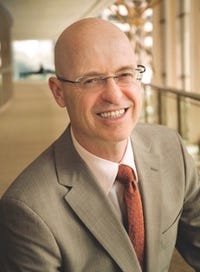.png?width=700&auto=webp&quality=80&disable=upscale)
Institute of Integrative Nutrition sends in the health coachesInstitute of Integrative Nutrition sends in the health coaches
Joshua Rosenthal, founder of the Institute of Integrative Nutrition (IIN), talks with Natural Foods Merchandiser about how to make the most of natural partnerships with health coaches.

 When Joshua Rosenthal founded the Institute of Integrative Nutrition (IIN) 20 years ago, he wanted to offer a broad nutrition curriculum along with a business-building education. Today, the New York City–based school’s more than 30,000 students and graduates from across the U.S. and 100 countries are prepared to address myriad health concerns and support clients in doctors’ offices, health clinics and stores like yours. Rosenthal talks with Natural Foods Merchandiser about how to make the most of this natural partnership with health coaches.
When Joshua Rosenthal founded the Institute of Integrative Nutrition (IIN) 20 years ago, he wanted to offer a broad nutrition curriculum along with a business-building education. Today, the New York City–based school’s more than 30,000 students and graduates from across the U.S. and 100 countries are prepared to address myriad health concerns and support clients in doctors’ offices, health clinics and stores like yours. Rosenthal talks with Natural Foods Merchandiser about how to make the most of this natural partnership with health coaches.
Natural Foods Merchandiser: What inspired you to start IIN?
Joshua Rosenthal: My parents were dedicated to social causes and helping to improve the lives of other people. Thirty years ago, I found my own way to express this when I realized that food changes everything. The food we eat enters our system and eventually becomes our skin, hair, tissues, organs, blood and bones. Every day, at every meal, people have the power to transform themselves through food—for better or for worse.
NFM: Nutrition advice changes constantly. How do you keep the institute’s curriculum current?
JR: We rigorously update our program to include the newest research, trends and speakers. Our goal is to present a wide spectrum of unbiased information for learners at every level, because our students range from doctors to people who haven’t graduated from high school. Students determine what works for them after learning from top experts in the nutrition and wellness fields and getting a deep understanding of how the body works. There’s no one right way of eating that applies to everyone—we call this bio-individuality—which is why we offer information about more than 100 dietary theories.
NFM: IIN is graduating more health coaches than ever. How has interest in this profession and the public’s perception of it changed since you started the school?
JR: The U.S. is one of the wealthiest nations. We spend more money on health care than any country in the world by far, yet we are ranked 50th in terms of citizen health. One in three children in the U.S. is overweight or obese, and two out of three adults are overweight. There are 27 million adults with heart disease and 79 million people who are prediabetic. The health care crisis is growing. In a world of medications and operations, people want preventive solutions. This is what health coaches can offer, and, increasingly, more of the public is becoming interested.
NFM: How can retailers best provide health education for customers?
JR: Retailers can serve the public by creating an environment that integrates health into the shopping experience. Offer recipes featuring the whole-food ingredients in your bulk department, such as using millet to make an easy gluten-free cereal. Most people know what to do; they just don’t know how to do it. This is where retailers can assist, although it’s not their sole responsibility to educate the masses. Working with health coaches can be very helpful.
NFM: How can health coaches and retailers successfully work together?
JR: We teach our coaches to work with retailers to put on workshops, lead healthy eating seminars, give store tours and assist customers as nutrition consultants. We also provide print materials that retailers can use in their stores that highlight the nutrient profiles of specific foods and explain how to use them. Retailers can call IIN to find recent graduates in their area.
Read how Tunie’s Natural Grocery and Vitamin Center in Florida puts a priority on customer consultation and education.
About the Author
You May Also Like



